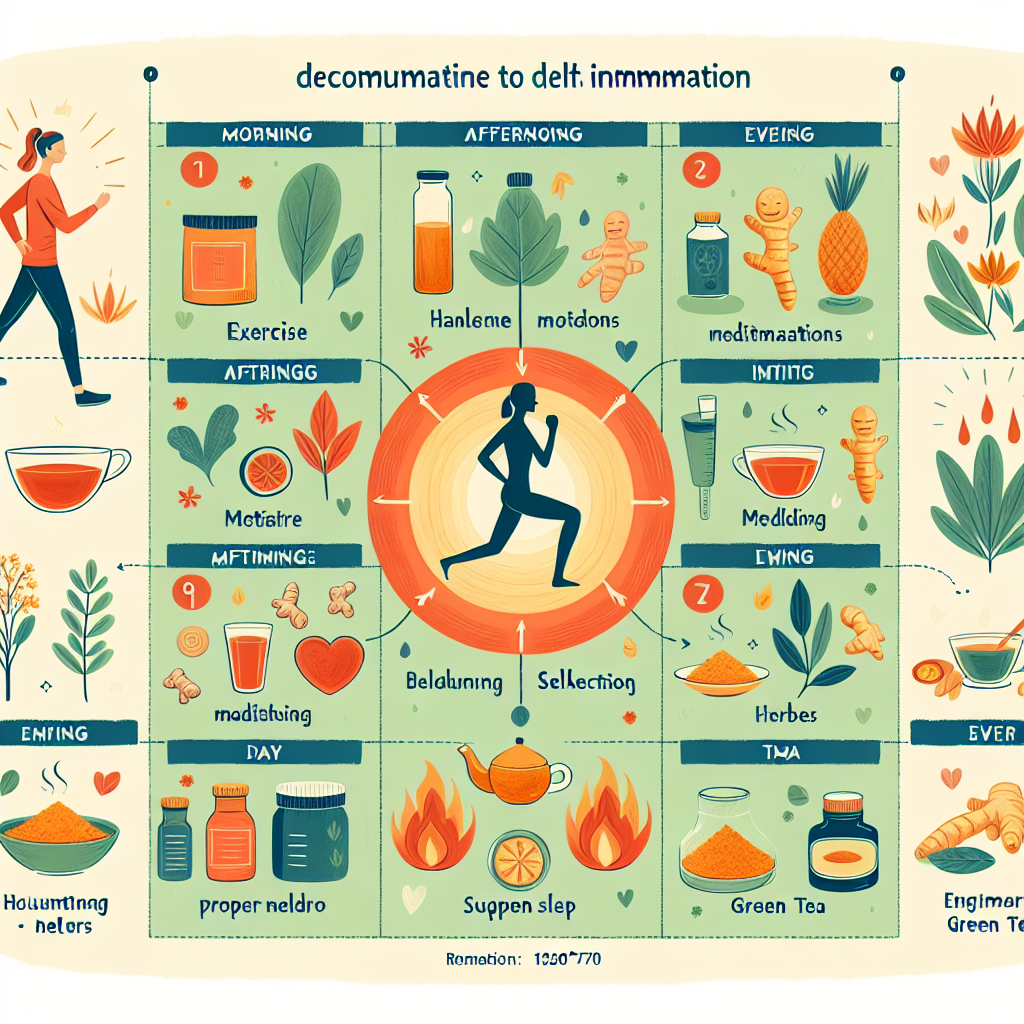Daily Habits and Herbal Remedies to Reduce Inflammation

Discover the power of daily habits and herbal remedies to reduce inflammation. Make a positive change in your life today by visiting My Vibrant Vitality for more information.
Daily Habits to Incorporate for Reducing Inflammation Naturally
Inflammation is a natural response of the body to injury or illness, acting as a protective measure to help the body heal. However, chronic inflammation can lead to various health issues, including heart disease, diabetes, and arthritis. Fortunately, there are daily habits and herbal remedies that can help reduce inflammation naturally.
Firstly, maintaining a healthy diet is crucial in managing inflammation. Foods rich in omega-3 fatty acids, such as fish, flaxseeds, and walnuts, are known to have anti-inflammatory properties. Similarly, fruits and vegetables, particularly those rich in antioxidants like berries and leafy greens, can help combat inflammation. Conversely, it is advisable to limit the intake of processed foods, sugars, and unhealthy fats, which are known to trigger inflammatory responses.
In addition to a balanced diet, regular physical activity is another essential habit to incorporate into your daily routine. Exercise helps to reduce inflammation by decreasing fat levels and improving immune function. It doesn’t necessarily mean you have to hit the gym every day; even moderate activities like walking, cycling, or yoga can make a significant difference.
Getting enough sleep is another critical factor in managing inflammation. Lack of sleep can disrupt the body’s inflammatory response, leading to increased inflammation. Therefore, ensuring you get seven to nine hours of sleep per night can help keep inflammation in check.
Stress management is also vital in reducing inflammation. Chronic stress can trigger an inflammatory response in the body, leading to various health issues. Techniques such as meditation, deep breathing, and yoga can help manage stress levels effectively.
Now, let’s delve into the world of herbal remedies that can aid in reducing inflammation. Turmeric, a spice commonly used in Asian cuisine, contains a compound called curcumin, which has potent anti-inflammatory properties. Incorporating turmeric into your diet or taking it as a supplement can help manage inflammation.
Ginger is another herb known for its anti-inflammatory effects. It contains compounds called gingerols, which can reduce inflammation and alleviate pain. You can add ginger to your meals or drink it as a tea for its beneficial effects.
Green tea is also a powerful anti-inflammatory agent, thanks to its high content of antioxidants called catechins. Regular consumption of green tea can help reduce inflammation and protect against various diseases.
Lastly, omega-3 fatty acids, found in fish oil and flaxseed oil, are known for their anti-inflammatory properties. They can reduce inflammation and provide relief from symptoms associated with it. You can incorporate these oils into your diet or take them as supplements.
In conclusion, reducing inflammation naturally involves a combination of healthy lifestyle habits and the use of herbal remedies. By maintaining a balanced diet, engaging in regular physical activity, ensuring adequate sleep, managing stress, and incorporating anti-inflammatory herbs into your diet, you can effectively manage inflammation and improve your overall health. Remember, it’s always advisable to consult with a healthcare professional before starting any new health regimen.
Herbal Remedies: A Natural Approach to Combat Inflammation

Inflammation is a natural response of the body to injury or infection, acting as a protective measure to eliminate harmful stimuli and initiate the healing process. However, when inflammation becomes chronic, it can lead to serious health conditions such as heart disease, diabetes, and cancer. Fortunately, there are daily habits and herbal remedies that can help reduce inflammation and promote overall health.
Firstly, maintaining a healthy diet is crucial in managing inflammation. Foods rich in omega-3 fatty acids, such as fish, nuts, and seeds, are known to have anti-inflammatory properties. Similarly, fruits and vegetables, particularly those rich in antioxidants like berries and leafy greens, can help combat inflammation. Conversely, processed foods, sugars, and unhealthy fats can exacerbate inflammation, so it’s advisable to limit their intake.
Regular exercise is another daily habit that can help reduce inflammation. Physical activity promotes the production of anti-inflammatory substances in the body, thus helping to control inflammation. It’s recommended to engage in at least 30 minutes of moderate exercise most days of the week. This could include activities such as walking, cycling, swimming, or even gardening.
In addition to these lifestyle habits, there are also a number of herbal remedies that can help combat inflammation. Turmeric, for instance, contains a compound called curcumin, which has potent anti-inflammatory properties. It can be consumed in various forms, such as in capsules, teas, or as a spice in cooking. Ginger is another herb known for its anti-inflammatory effects. It can be consumed fresh, in tea, or in supplement form.
Green tea is also a powerful anti-inflammatory agent due to its high content of antioxidants known as catechins. Regular consumption of green tea can help reduce inflammation and protect against certain inflammatory diseases. Similarly, rosemary, with its active ingredient rosmarinic acid, has been shown to have anti-inflammatory and antioxidant effects.
Another herb worth mentioning is Boswellia, also known as Indian frankincense. It has been used for centuries in traditional medicine for its anti-inflammatory properties. Boswellia can be taken as a supplement or used topically as an oil.
While these herbal remedies can be effective in managing inflammation, it’s important to remember that they should not replace conventional medical treatment. Always consult with a healthcare professional before starting any new supplement regimen, especially if you have a pre-existing medical condition or are taking other medications.
In conclusion, managing inflammation is not just about taking supplements or medications. It involves a holistic approach that includes a healthy diet, regular exercise, and the use of natural herbs. By incorporating these daily habits and herbal remedies into your lifestyle, you can help reduce inflammation and promote overall health. Remember, the key to managing inflammation lies in maintaining a balanced lifestyle and making healthy choices.
The Role of Daily Habits and Herbal Remedies in Inflammation Reduction
Inflammation is a natural response of the body to injury or infection, acting as a protective measure to eliminate harmful stimuli and initiate the healing process. However, chronic inflammation can lead to various health issues, including heart disease, diabetes, and cancer. Therefore, it is crucial to manage and reduce inflammation effectively. This article will explore the role of daily habits and herbal remedies in inflammation reduction.
Firstly, it is essential to understand that our daily habits significantly influence our overall health, including inflammation levels. A balanced diet, regular exercise, adequate sleep, and stress management are all critical components of a healthy lifestyle that can help reduce inflammation.
A diet rich in anti-inflammatory foods is a powerful tool for inflammation reduction. Foods rich in omega-3 fatty acids, such as fatty fish, walnuts, and flaxseeds, are known for their anti-inflammatory properties. Fruits and vegetables, particularly those rich in antioxidants like berries and leafy greens, can also help combat inflammation. Conversely, processed foods, sugary drinks, and foods high in saturated fats can exacerbate inflammation and should be avoided.
Regular physical activity is another crucial aspect of reducing inflammation. Exercise promotes better circulation and helps reduce fat tissue, a significant source of inflammation-promoting chemicals. Even moderate activities like walking or cycling can have a significant impact if done consistently.
Adequate sleep and stress management are often overlooked but are equally important. Lack of sleep and chronic stress can trigger inflammation. Therefore, ensuring a good night’s sleep and incorporating stress-reducing activities like meditation or yoga into your daily routine can be beneficial.
Transitioning from daily habits, let’s delve into the world of herbal remedies. Herbal remedies have been used for centuries to treat various ailments, including inflammation. They offer a natural, side-effect-free alternative to conventional anti-inflammatory drugs.
Turmeric, a spice widely used in Asian cuisine, contains curcumin, a compound with potent anti-inflammatory properties. Regular consumption of turmeric, either in food or as a supplement, can help reduce inflammation. Similarly, ginger, another common spice, has been shown to have anti-inflammatory effects comparable to non-steroidal anti-inflammatory drugs.
Green tea, rich in antioxidants and polyphenols, is another herbal remedy that can help combat inflammation. Regular consumption of green tea has been linked to a reduced risk of heart disease and certain types of cancer, both of which are associated with chronic inflammation.
Lastly, omega-3 fatty acids, found in fish oil and flaxseed oil, have been shown to reduce inflammation. These can be taken as supplements if it’s challenging to get enough from your diet.
In conclusion, daily habits and herbal remedies play a significant role in inflammation reduction. A balanced diet, regular exercise, adequate sleep, and stress management, coupled with the use of anti-inflammatory herbs and supplements, can help manage and reduce inflammation effectively. However, it’s important to remember that while these strategies can help reduce inflammation, they should not replace conventional medical treatment for chronic inflammatory conditions. Always consult with a healthcare professional before starting any new health regimen.